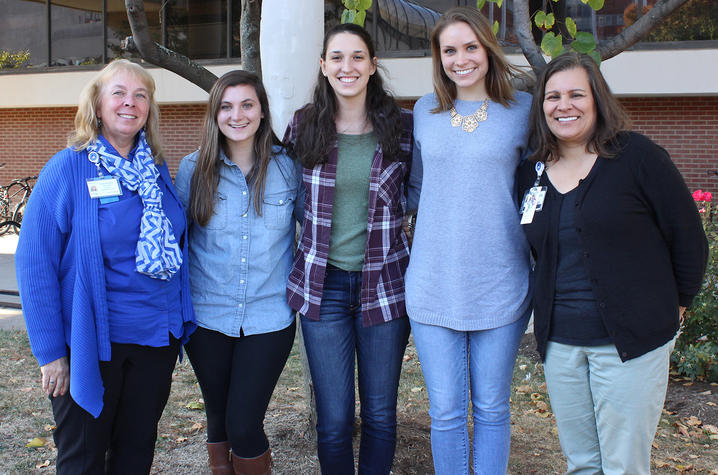Nursing Students SMASH Stigma of Mental Health Through Peer Support

LEXINGTON, Ky. (Dec. 5, 2016) — For students pursuing a degree in nursing and other health professions, pressure to perform comes from every direction.
Students feel pressure to master both clinical skills and classroom material. They balance their academic life and clinical rotations with commitments to family, relationships and extracurricular activities. Many are still adjusting to college life away from home. And for the first time, they must cope with the common occurrence of human pain and suffering in medical settings, which can affect their thoughts and mental wellbeing.
Senior nursing student Sarah Wise wondered if she was the only student in her nursing class who felt the weight of the world on her shoulders. Once she opened up to her friends and classmates about her own mental health concerns, she realized that she was not an exception — struggling with depression, anxiety and stress was a common experience for her classmates.
“I remember when I was going through a hard time looking around and thinking, ‘Am I the only one having a hard time? What’s wrong with me?’” Wise said.
Wise shared her emotional and mental hardships with a group of trusted peers at a lunch break during the spring semester. The students each revealed personal struggles with stressors related to nursing school. Wise, along with fellow nursing students Kayla Combs and Cassie Snodgrass, organized a research project investigating the prevalence of mental health conditions in undergraduate nursing students.
“We’d all had our own experiences that tested our ability to cope with these issues,” Combs said. “We thought, ‘what if this is a wider issue affecting more than just our senior class?’”
During the summer, the group conducted a survey of 160 UK nursing sophomores in the nursing program. The sophomore year of nursing school is a critical and busy time for nursing students when clinical rotations begin. Their survey results showed 27 percent of sophomore students were taking a medication for a mental health disorder and 30 percent reported dealing with a mental health condition. When ranking the degree of stress they felt during nursing school, most students reported levels of eight and nine on a one to 10 scale. The survey also showed that few students were taking advantage of on-campus mental health resources.
The three seniors organized Student Mentors Advocating for Student Health (SMASH) on the premise that peer-to-peer support and faculty involvement can help dissolve the stigma of mental health disorders and encourage nursing students to seek help for mental health issues. The students have partnered with College of Nursing faculty members Joanne Matthews and Cathy Catlett to promote a healthy school-life balance and create a college culture where students can address the emotional and mental burden of a nursing education and career.
Combs said adjusting to the nursing grading system and having interpersonal contact with sick patients took a toll on her mental health. She said failure in a clinical skills test “felt like the end of the world.” She was further rattled when she witnessed a case of shaken baby syndrome during her clinical rotations.
“We’re going deeper into our patients’ lives and trying to understand how their family feels,” Combs said. “Sometimes it weighs heavy on your heart.”
Combs has since developed coping skills to manage her emotions, grade expectations and thoughts, but she said not all nursing students acquire these abilities on their own. The founders of SMASH believe having peer advisers available to teach coping and stress management skills can help nursing students early in their training. They want fellow health college students to know they aren’t alone in dealing with mental health conditions. They are working on implementing peer support interventions and fostering student connectedness to add another “layer” of resources available to students in the College of Nursing.
After getting her bachelor’s, Snodgrass plans to continue examining mental health issues in nursing education in her doctoral work. Mental health issues are at high rates in the health care professions, with nurses experiencing depression at twice the rate of other individuals.
The SMASH founders, who are graduating seniors, are recruiting the next class of nursing students to continue building the SMASH model. They are organizing regular meetings where students dealing with stress can meet one-on-one with another student. They also provide campus mental health resources, and hope the initiative will spread to other health colleges. They are aware the stressors of a career in health care span across disciplines, and believe peer-based support networks can make mental health treatment more approachable and accessible to students.
Visit SMASH on Facebook by clicking here.
MEDIA CONTACT: Elizabeth Adams, elizabethadams@Uky.edu




